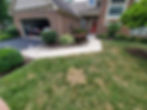Pavers Cincinnati
Transform your outdoor space into a personal retreat with a custom paver patio! Imagine relaxing on a beautifully crafted, durable surface that adds style, function, and value to your home. Whether you’re looking to entertain, dine, or simply unwind, a paver patio is the perfect addition. Contact us today to explore design options and see how we can bring your vision to life with expert craftsmanship and top-quality materials!


Why Choose Us?
Every crewmember gets certified through Reading Rock's program- The largest local retaining wall block & paver manufacturer
14 years of experience
Work with the same engineer for last 5 years & we can handle all permits & design
Residential, commercial, raised and sunken in patios
Familiar with local codes & site conditions in Cincinnati and Surrounding areas like NKY, Harrison, and Dayton
Free estimates & consultations
Itemized estimates provide transparency
One crew focuses on one project at a time
Clear communication & Friendly staff
Reviews on Google, Angi, Homeadvisor, etc.
We can handle all of your outdoor living, construction, & landscaping needs

More on Pavers
Paver patio installs in Cincinnati are becoming more and more popular. The beautiful textures and contrasts possible with pavers are almost limitless.
Interlocking pavers are commonly referred to as:
-
pavers
-
patio pavers
-
brick pavers
-
block pavers
-
concrete pavers
Pavers are typically made of concrete and come in many different colors, textures, and sizes which will be picked according to your specific project design/taste. We consider the colors of your home (or business), landscape, surrounding structures, and your taste of course. We use 3-D design software to bring your dream to a visual representation.
Patio paver installation in the Cincinnati area needs special attention to their base preparation and unfortunately, this is where most contractors fall short. This goes for all structure bases, retaining walls, concrete patios, walls, and asphalt. Due to our freeze-thaw cycles, the ground essentially moves from season to season causing cracks in rigid structures. Pavers have more flexibility and can handle seasonal changes.





















Qualities of a good base for paver patios:
-
6 inches of gravel minimum (57's angular)
-
sub-base soil is sloped to the intended area
-
1 inch or less of #9 limestone (ideally 3/4 ")
-
gravel base level to ensure 3/4 " thick sand bed- no dips or high spots
The colder the environment the more common pavers are. Due to their easy maintenance and ability to move with the freeze-thaw action as opposed to larger surfaces like poured concrete and asphalt which almost always crack.
The smaller size and controlled environments brick pavers are produced in ultimately, create a superior product. Nothing is perfect so imperfections do happen but are much rarer than poured concrete surfaces.
On average pavers are twice the strength of poured concrete. Some other benefits:
-
Easy access to buried utilities
-
Many colors & finishes
-
Small chance of cracking
-
Easy to re-level in the event of settling
-
easy to replace broken pavers
-
some manufacturers provide lifetime warranties against corrosion
Patio Paver Base or Paver Base
Base Material For Driveway Pavers
How deep should the rock base be for driveway pavers?
It can vary from location but on average 10 inches or more of the gravel base, plus road base fabric. Check with local building departments for recommendations in your area.

Paver Gurantee
Every paver project comes with a 10-year no sinking or settling guarantee. We stand behind our work for a minimum of 10 years and it can be upgraded to a lifetime. Just ask Joey for more details.
Paver Sealing
Pavers can also greatly benefit from sealing every 3-5 years to protect their color and finish. It can be a good idea to re-apply sand or poly sand at this time depending on the weathering (sun exposure, rain/snowfall, ice melts, etc.) your pavers experience. If you have a decent amount of weeds growing through the cracks it could be time to sand and seal. Call us for more info or to set up a consultation meeting.
Ready for a quote? Click here to get started now
Check out our landscaping services to go with your pavers.
Myths About Pavers
"Pavers are too costly."
The cost to install pavers is similar in cost to stamped concrete (when professionally installed). Compared to composite decking the cost can be half!
"Pavers don't work in Freeze-Thaw conditions."
On the contrary, pavers are IDEAL for these conditions. Concrete cracks because it has the least amount of flexibility and asphalt as well. Pavers are the most flexible system there is and this does NOT mean settling occurs. What are you going to do when concrete cracks?
"Concrete Pavers won't last."
Unlike natural stone and stamped concrete, each paver carries a lifetime guarantee. Our professional company has a lifetime guarantee on installations! Some manufacturers provide lifetime warranties on their products like Unilock
"Concrete Pavers Fade."
NOT ANYMORE. Now with Unilock technological advancements of EnduarColor & EnduraColor Plus fading is a thing of the past. Also, all other pavers have advancements with mixtures that tremendously decrease fading.
"Pavers will become uneven."
With a professional installation, this does not occur which is why we offer a lifetime guarantee to protect you in case of uneven pavers.
"Pavers complicate snow removal."
Pavers can be cleared of snow with a plow but a polyurethane or rubber cutting edge is highly recommended as the surface will be even(metal is more likely to chip pavers). Most pavers have salt tolerances that make them hold up better than concrete. The heat from the earth can move through the joints which help melt ice and snow faster.
"Pavers allow weeds between spaces."
Polymeric sand and joint-stabilizing sealers make weeds a thing of the past.

